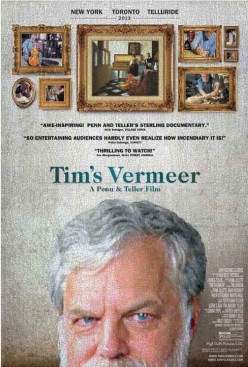
 Tim’s Vermeer (IMDB) is a fascinating documentary by Penn and Teller. (Penn Jillette narrates while Teller, of course, directed.) It tells the story of an eccentric inventor who becomes obsessed with an artistic mystery.
Tim’s Vermeer (IMDB) is a fascinating documentary by Penn and Teller. (Penn Jillette narrates while Teller, of course, directed.) It tells the story of an eccentric inventor who becomes obsessed with an artistic mystery.
Tim Jenison had made a successful career as the inventor of a number of video processing gadgets. He became fascinated with the theory that Renaissance artists used a variety of optical devices to develop their painting techniques. In particular he became obsessed with the 17th century Dutch Master Johannes Vermeer who is famous for the complex and subtle lighting of his paintings.
Did Vermeer have a super-human ability to sense absolute lighting levels? Or was he actually a brilliant engineer who enhanced the camera obscura (a primitive device that could project a 3-dimensional scene onto a wall) into something that would allow a painter to create something resembling a photograph?
Tim had the insight that Vermeer might have accomplished this by suspending a small mirror over the canvas to reflect the scene projected by the camera obscura. Even though he himself had no experience as a painter Tim was able to use this technique to accurately duplicate in oil paint a black-and-white photograph of his father-in-law.
Encouraged, Tim embarked on a much more ambitious project: to create a duplicate of “The Music Lesson,” one of Vermeer’s most complicated paintings, using only technology available in the 17th century.
It was a project that would take years. He built a duplicate of Vermeer’s studio. He built a huge camera obscura, grinding the lens by hand. He traveled to Amsterdam to find out everything he could about Vermeer. He traveled to London and convinced the Queen to let him study the original painting where it hangs in Buckingham Palace.
When he finally had everything ready it took him 130 days to create the painting. If Vermeer did use this technique it was no shortcut. But the final result looked amazingly good.
Did Vermeer actually use this technique? It’s impossible to be sure, but some of his paintings do have features that could be lens artifacts.
If he did do this, would it make Vermeer any less of an artist? Many art historians seem to think that it would. Actual painters, who know that their work involves a lot of technology, are much more receptive to the idea that Vermeer was a brilliant inventor.

